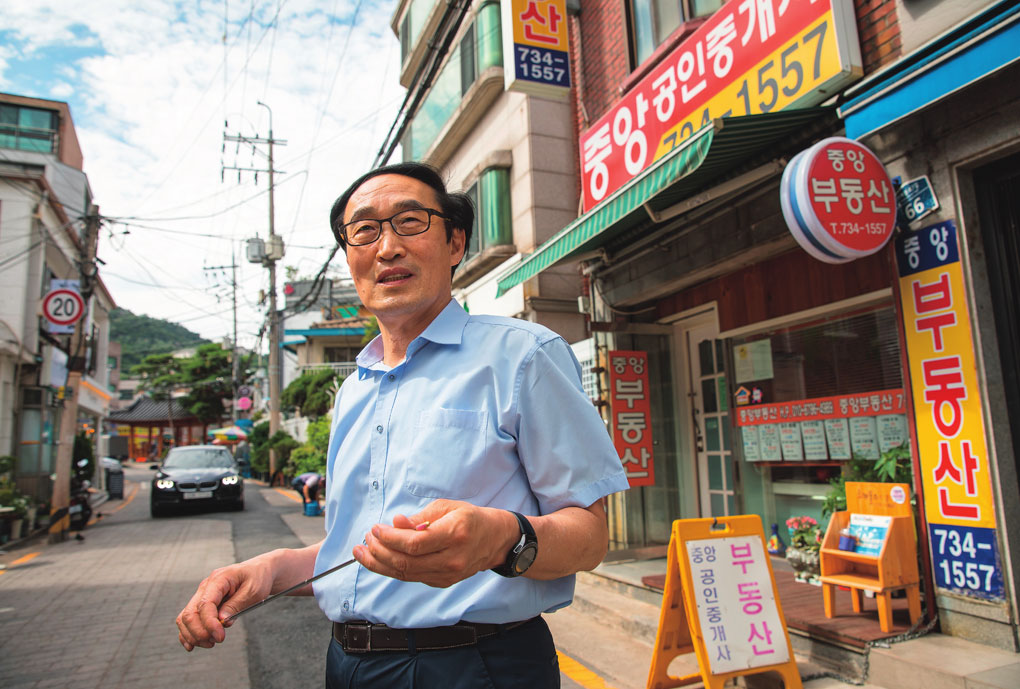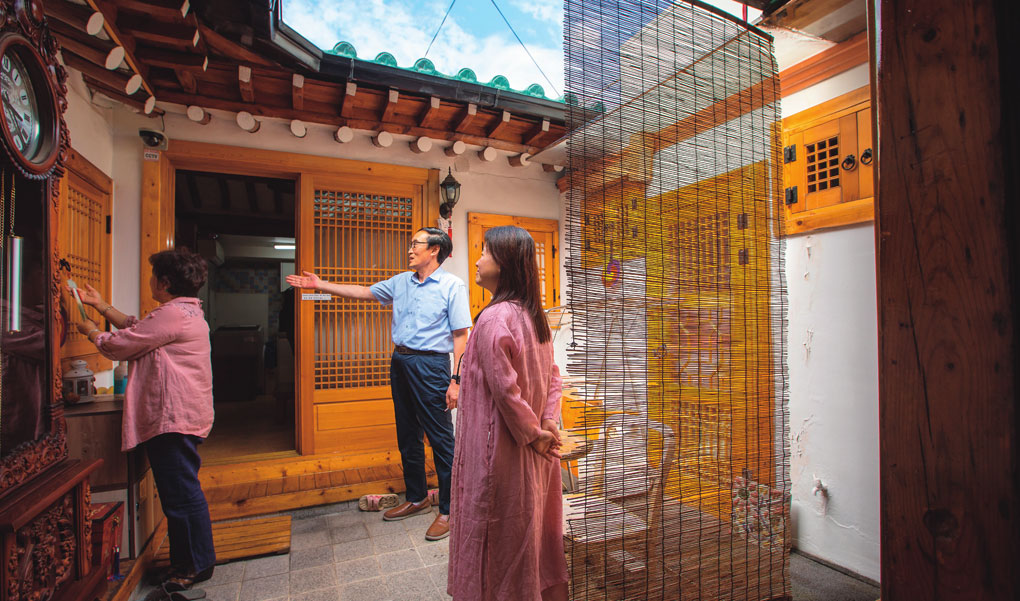Some real estate agencies still continue to serve as spaces for local residents to drop by and socialize. Cho Kang-hee, a fixture in a neighborhood of traditional Korean houses in Seoul’s old city center, offers candor over salesmanship.

Standing in front of the real estate office he has been running for the last 15 years, Cho Kang-hee explains the ins and outs of the Seochon area.
Once known as bokdeokbang, which translates roughly to “room of good fortune,” realtors’ offices long served a role beyond their official purpose. They were a kind of neighborhood parlor, similar to a sarangbang, the master’s study-cum-reception room in a traditional Korean house. With their doors thrown wide open, people would gather in these offices to share stories and connect. This was where the seed of a neighborhood rumor would be planted, watered and grown, expanding out into the world.
When someone was in trouble, a real estate agency could become a place to marshal support. It was where good news was celebrated with warm veggie pancakes and a bowl of makgeolli (rice wine), and hard times saw the sharing of hugs and consolation. This, of course, was a different time, when the distance between people was a bit narrower than it is today, and the rooftops in each neighborhood – row after row – were still low.
As the low roofs of the cities became higher and higher, turning into high-rise apartments that seem to touch the sky, neighborhoods grew less homey. Now operating under awkward, wordy signs that read “Licensed Real Estate Agent Office” instead of “Bokdeokbang,” these spaces no longer play their cherished role. There is still one corner of this world, however, where these doors of the past remain open. The road to that amiable neighborhood feeling, that genuine connection, leads to Seochon.
Gyeongbok Palace is the largest and most magnificent of Seoul’s five major palaces. The villages to its north and west are known, respectively, as Bukchon and Seochon (“buk” meaning north and “seo” meaning west). During the Joseon era (1392-1910), the nobility made their homes in Bukchon, while members of the emerging class of professionals like interpreters and doctors gathered in Seochon. Famous artists, too, including painters and poets, called Seochon their home.
These days, the hanok of Seochon are preserved by government grants in a manner similar to those of Bukchon. But compared to the bigger and statelier Bukchon hanok, Seochon hanok tend to be more modest. A tangled spider web of little alleyways twists and turns between the clusters of these humble houses, huddled together shoulder to shoulder. Amid these alleyways, Cho Kang-hee has operated his Central Licensed Real Estate Agent Office for the past 15 years.
Road to the Past

Cho organizes his notes on his activities of the day. His office has an average of three potential clients coming by per day; one or two out of every 10 culminates in the signing of a deal.
“Seochon is near the center of the city, but it also abuts a beautiful mountain and a large park,” Cho says. “These aren’t people who are buying and selling houses to try and make money; most of them want to live here because they like the neighborhood.”
The houses here are generally small hanok of about 65 to 100 square meters, which canmany inconveniences. But they also have advantages that apartments lack. Cho has compiled a reference list of hanok pros and cons for his meetings with clients.
“These are houses made of natural materials like wood, stone and earth, which are good for your health. There’s a sense of being grounded, and it’s easy to get to know your neighbors. The actual living area may be small, but it’s also cute and cozy. People have a lot of fun decking out the little gardens, and there’s good air circulation. And you can really experience the changing of the seasons – it’s never boring. On the other hand, the all-natural materials do attract insects, and both insulation and soundproofing can be challenging. Vulnerability to fire and water can be a weakness, but some of this can be improved with renovation. The roof, the walls and the wooden maru floor all need regular maintenance, but the government offers grants to cover that, so it won’t ever be a financial burden.”
Because of its close proximity to the presidential compound, the Blue House, the heightened security that followed an assassination attempt by North Korean commandos in 1968 lasted well into the 1980s, making Seochon a rather uncomfortable area for ordinary citizens to live. Anyone entering or exiting the neighborhood had to identify themselves at a checkpoint, and any guests staying overnight had to be reported.
Cho recalls, “Riot police were always standing guard, and that, together with strict restrictions on development, meant there was a lot to discourage moving to the area. There was a moment in the late 1990s when a rumor circulated that building regulations were about to be loosened, and people flocked here. But even then, you couldn’t build very high – seven stories maximum along the main road and five stories further into the neighborhood. When this area became an officially designated hanok conservation zone in 2010, a lot of people were disappointed. Because that meant that even if you tore down an old structure, you could only build another hanok in its place.”
Thus, the neighborhood has remained an island, serene and quiet in the middle of Seoul’s jungle of high-rise buildings and steady streams of pedestrians and vehicles. Clocks run slower in Seochon. People come here to walk a little slower, to get an unobstructed view of the skies. Bukchon actually first laid claim to this special kind of “slowness.” Before long, cute little shops began opening in between the perfectly preserved hanok, bringing crowds of curious young people. Then, just as business started taking off, landlords raised the rent. Unable to cover the higher rates, many proprietors relocated to Seochon. Around this same time, hanok converted into guest houses began appearing as well, naturally attracting international visitors.
Cho was born in Seoul. His first job was in the office of a construction company. He eventually began working for a conglomerate, managing one of its subcontracts. The job had him running a factory for 12 years. Then in 2005, a Chinese factory began making the exact same electronic part as his workplace did. His factory closed down virtually overnight. Cho had to take on immense personal debt to cover wages and severance pay for his workers.
“It was just as both my children were starting college. I needed to keep making money, but being over 50, there was nothing really clear for me to do,” Cho says. “That was when I ran into an older cousin who was working as a licensed real estate agent. I thought I should at least try my hand at it, so I enrolled in a course.”
He was 52 years old at the time.

Each time he takes a client to see a property, Cho Kang-hee is sure to provide a detailed list of the pros and cons of living in a hanok. He makes sure to mention that while the hanok of Seochon may be small, the traditional-style homes are cozy and conducive for getting to really know neighbors.
A Desperate Choice
“My wife was running a restaurant then. Every morning, I would go shop for ingredients and deliver them to her, then head to class. I slept four hours a night. I started studying in March 2006, and I passed the test the following February. I was desperate.”
Cho passed the test in one try, completed an apprenticeship, then took the advice of his course director and chose Seochon to establish his own office. Now, 15 years have already passed in this exact spot, and every day before 10 a.m., he’s there to open the doors.
“Before this job, I had no interest in real estate,” he says. “I always thought you made a living by working hard, earning as much as the effort you put in. Making money by investing was something that just never occurred to me. Even coming and finding my place here, I just blindly trusted that it would be good enough because my course director had recommended it to me. But then, after doing this work a while, I did get a little bit greedy. I even looked into moving to a different neighborhood, though that didn’t work out.”
The neighborhood he considered was one in Gyeonggi Province, full of apartment complexes. Apartments have identical interior layouts. All anyone needs to do is do a simple check of a unit’s size, floor and interior condition. The properties in Seochon, on the other hand, cannot be known without visiting them one by one to see them firsthand. Moreover, agencies in large apartment complexes have meetings where they can share their real estate listings, but to attend, one must pay an expensive membership fee. Unable to muster the cash, Cho ended up staying in Seochon for good.
Cho’s day starts at 7:30 a.m. After having breakfast and getting ready for work, he leaves his home in Pyeongchon New Town around 8:30 a.m. for a long subway ride into Seoul. The trip from home to office, door to door, takes 90 minutes. In the evening, Cho returns home around 9 p.m. His routine never wavers, Monday through Saturday, plus public holidays.
“Sundays I don’t think about work at all, and get some real rest. I clean the house. I go on hikes. I don’t have any particular hobbies, and I’m not a big drinker. That’s about it, that’s essentially my life.”
“Sundays I don’t think about work at all, and get some real rest. I clean the house. I go on hikes. I don’t have any particular hobbies, and I’m not a big drinker. That’s about it, that’s essentially my life.”
A Sense of Ethics
Every day, three potential clients on average come by the agency, and one or two out of every 10 end up sealing a deal. There can be difficult clients and unpleasant situations, but it’s still a sustainable living so he is able to take it in stride. When a client returns with a small gift to thank him for finding a good home, Cho returns the compliment, giving credit to “the client’s own good luck.”
“Bokdeokbang” may now have become “Licensed Real Estate Agent Offices,” but local Seochon residents still drop by Cho’s office to catch up on the latest gossip and have a cup of tea. The agency also offers some simple services for free, like sending faxes, making copies, or getting certified proof of registry.
“A broker must have a sense of ethics. This is a line of work where speculation tends to be encouraged. It doesn’t apply to everyone, of course, but if you start to get greedy, that leads to problems. I’m not good at bluffing, and I’m not a smooth talker. I’m really more of a civil servant or teacher type. Even so, what I like about this job is that as long as you can move your body and use your brain, you can keep working. There’s no retirement age.”
The door opens: another potential lucky client looking for an honest broker to help realize the dream of a nice, slow life in nice, slow Seochon.